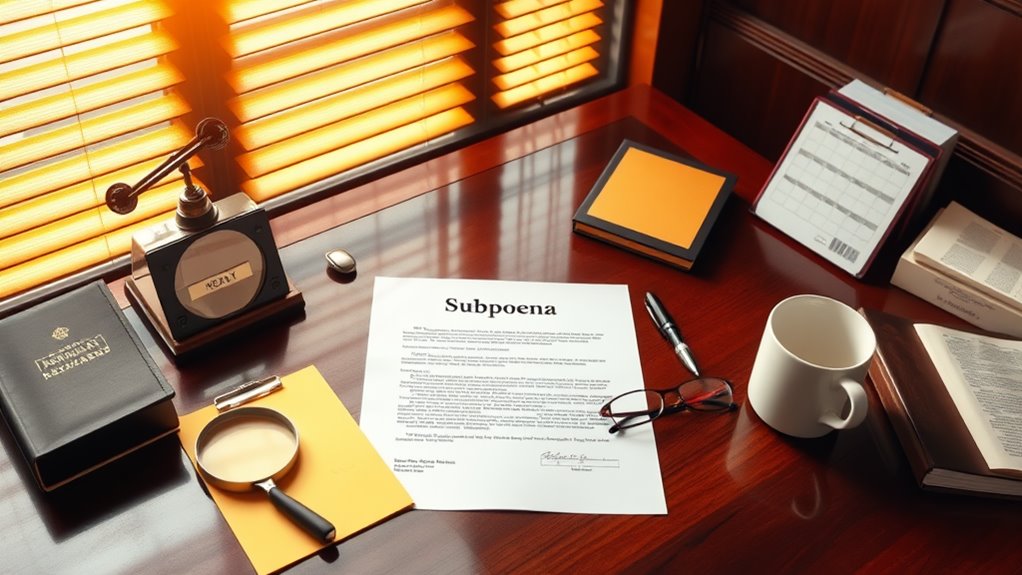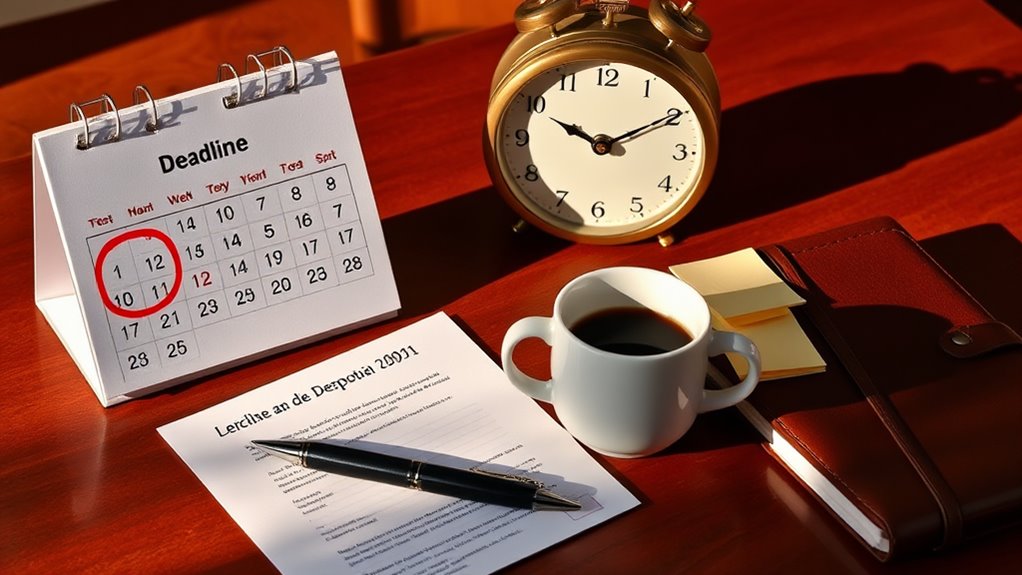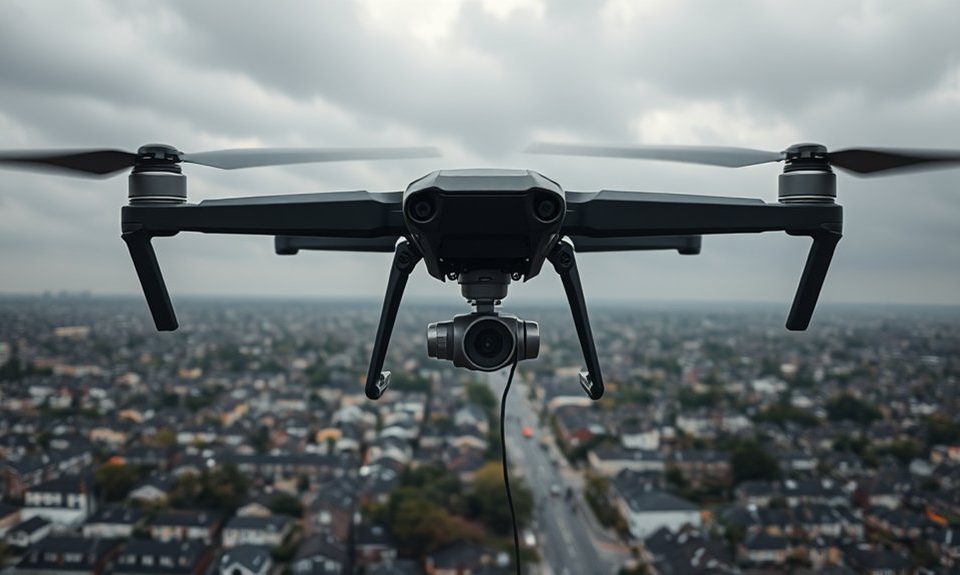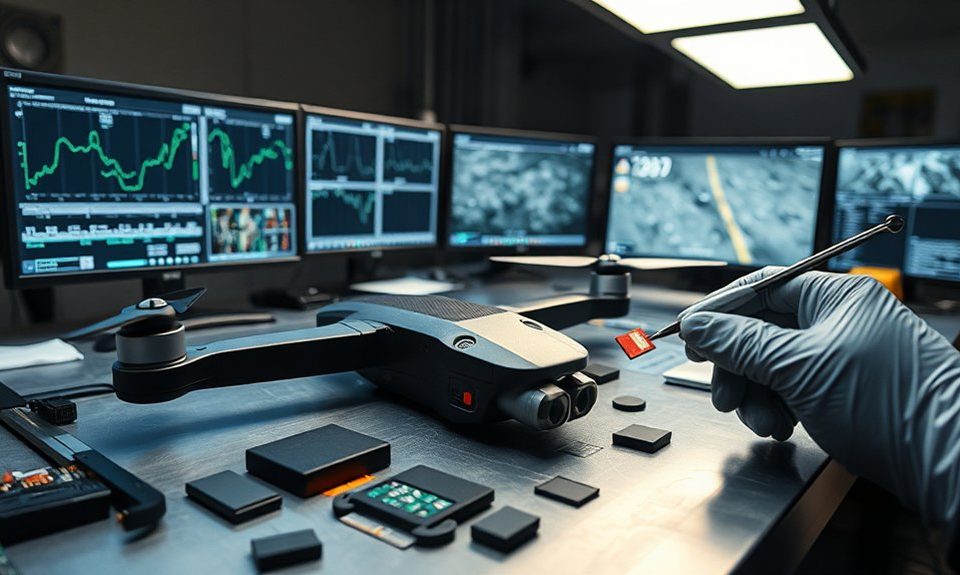To properly respond to a subpoena, one should follow five steps. First, clearly understand the subpoena’s requirements. Next, consult an attorney for tailored guidance. Then, gather all requested documents, ensuring they are organized. It’s essential to respond by the specified deadline to avoid penalties. Finally, prepare for possible testimony by reviewing relevant materials and anticipating questions. For further details on each step and best practices, additional insights are available.
Key Takeaways
- Understand the subpoena’s requirements and type, ensuring clarity on what is being requested.
- Consult an attorney for tailored legal advice and to clarify any ambiguities in the subpoena.
- Gather and organize all requested documents systematically to facilitate a thorough response.
- Respond to the subpoena by the deadline to avoid legal repercussions and demonstrate compliance.
- Prepare for possible testimony by reviewing documents, anticipating questions, and practicing responses with legal counsel.
Understand the Subpoena

A subpoena serves as a formal legal document compelling an individual to provide testimony or produce evidence in a legal proceeding. Understanding the different subpoena types is vital for traversing the legal landscape effectively. There are generally two main types: a subpoena ad testificandum, which requires a person to testify, and a subpoena duces tecum, which mandates the production of documents or other evidence. Familiarity with this legal terminology helps individuals grasp their obligations and rights under the law. Responding appropriately to a subpoena is fundamental to guarantee compliance and protect one’s legal interests. By comprehending the nature and requirements of the subpoena, individuals can proceed with informed confidence in the legal process, fostering a sense of empowerment during potentially stressful situations. Additionally, understanding the legal boundaries surrounding evidence collection can aid in navigating the complexities of a subpoena.
Consult an Attorney
Seeking legal counsel is a critical step when responding to a subpoena. Engaging an attorney guarantees that individuals receive appropriate legal representation tailored to their specific situation. Attorneys possess the expertise to navigate the complexities of legal processes, providing guidance on rights and obligations. They can help to clarify any ambiguities in the subpoena and advise on the best course of action. While attorney fees may vary, the investment in professional legal advice can protect individuals from potential legal repercussions. Consulting an attorney not only fosters a deeper understanding of the legal landscape but also instills confidence in managing the next steps effectively. Ultimately, having skilled legal support can make a significant difference in the outcome of the proceedings. Additionally, attorneys may recommend engaging a private investigator to conduct thorough background checks that could be crucial for responding effectively to the subpoena.
Gather Requested Documents
Collecting the requested documents is an essential step in responding to a subpoena. Effective document organization is crucial to guarantee that all materials are readily accessible and relevant. Individuals should begin by reviewing the subpoena carefully to identify specific documents needed. This helps streamline the gathering process and reduces the risk of missing critical evidence.
Next, it is important to implement evidence preservation practices. This may involve securing electronic files, maintaining original hard copies, and preventing any alterations or deletions. Organizing documents by category or date can further facilitate the retrieval process. By prioritizing thoroughness and accuracy in this phase, individuals can lay a strong foundation for a detailed and effective response to the subpoena. Additionally, consulting with professionals who specialize in civil litigation investigations can provide valuable insights into the documentation process.
Respond by the Deadline

Timely responses to subpoenas are essential to guarantee compliance with legal requirements. Failing to respond promptly can lead to significant legal implications, including potential contempt of court or adverse judgments. It is vital for individuals and organizations to mark the deadline clearly and prioritize their response efforts. This entails reviewing the subpoena thoroughly, gathering necessary documents, and delivering the response within the stipulated timeframe. By adhering to deadlines, parties demonstrate respect for the judicial process and avoid unnecessary complications. Additionally, responding promptly can foster a cooperative relationship with the requesting party, which may be beneficial in future interactions. Ultimately, maintaining a disciplined approach to deadlines reflects professionalism and an understanding of the gravity associated with legal obligations. Furthermore, utilizing professional surveillance and investigation services can aid in ensuring that all requested information is accurately compiled and presented.
Prepare for Possible Testimony
Preparing for possible testimony requires careful consideration and thorough preparation. Individuals facing a subpoena should engage in detailed testimony preparation to guarantee they present themselves effectively. This includes reviewing relevant documents, understanding the case context, and anticipating possible questions. It is essential to remain composed and articulate during testimony, as witness credibility can greatly influence the outcome of a case. Practicing responses with legal counsel can help clarify points and build confidence. Witnesses should also be aware of their rights and the legal process, as this knowledge can enhance their credibility. Ultimately, adequate preparation not only supports the individual’s case but also fosters trust in the judicial process. Furthermore, hiring a private investigator can provide expertise in gathering evidence that strengthens testimony and overall case validity.
Frequently Asked Questions
What Happens if I Ignore a Subpoena?
Ignoring a subpoena can lead to serious legal consequences. Individuals may face potential penalties, including fines or contempt of court charges, which could further complicate their legal situation, impacting both personal and professional aspects of their lives.
Can I Modify the Requested Documents?
Subpoena modification is permissible if the requested documents lack relevance or are overly burdensome. Parties may negotiate adjustments to guarantee compliance while protecting their interests, thereby fostering a cooperative approach to legal proceedings and document production.
Will My Employer Know About the Subpoena?
The notification of a subpoena may not automatically inform an employer, as confidentiality practices vary. Employees should consider discussing potential implications with legal counsel to guarantee proper understanding of employer awareness and confidentiality protocols.
What if I Cannot Meet the Deadline?
If an individual cannot meet a subpoena deadline, consulting legal representation is essential. They can provide guidance on compliance options, ensuring that the individual addresses the situation appropriately while minimizing potential legal repercussions.
Are There Any Costs Associated With Responding to a Subpoena?
Responding to a subpoena often incurs subpoena response costs, including potential legal consultation fees. Individuals may need to budget for attorney expenses, document preparation, and other related services, depending on the complexity of their situation.
Conclusion
In conclusion, responding to a subpoena requires careful attention to detail and adherence to legal protocols. By understanding the subpoena’s requirements, consulting with an attorney, gathering necessary documents, meeting deadlines, and preparing for potential testimony, individuals can navigate the process effectively. Taking these steps not only guarantees compliance with legal obligations but also helps protect one’s interests throughout the proceedings. Proper preparation is essential for a successful response to a subpoena.





